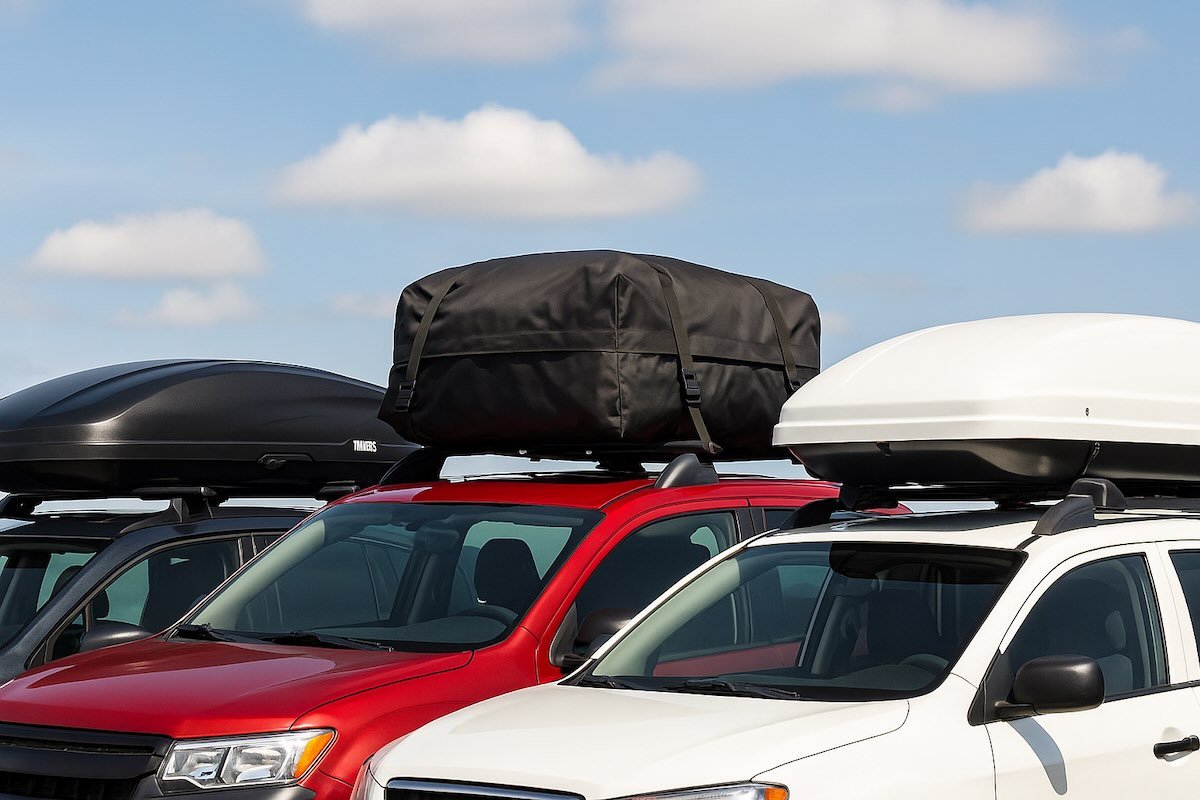What Is the Best Roof Top Carrier?
Whether you're planning a family road trip, hitting the Colorado mountains for a camping weekend, or just need extra space for your gear, a rooftop cargo carrier can make all the difference. With so many options available, choosing the best one can be overwhelming. This guide will help you find the best rooftop cargo carrier, whether you’re looking for a hard shell or soft shell option, budget-friendly or premium.
Types of Rooftop Cargo Carriers
There are two main types of rooftop cargo carriers: hard shell and soft shell. Each has its benefits and drawbacks.
Hard Shell Cargo Carriers:
Made of durable materials like ABS plastic.
Typically weatherproof and secure with locking systems.
More aerodynamic, reducing wind noise and drag.
Suitable for frequent travelers and those who need extra security.
Requires a roof rack for installation.
Soft Shell Cargo Carriers:
Made of water-resistant fabric, often PVC-coated.
Lightweight, flexible, and foldable for easy storage.
More affordable compared to hard shell options.
Ideal for occasional use or when space is limited.
Can be used with or without a roof rack.
Top Rooftop Cargo Carriers for SUVs and Families
1. Thule Motion XT (Large/X-Large)
Type: Hard Shell
Capacity: 16–21 cubic feet
Pros: Sleek design, easy mounting, dual-sided opening, aerodynamic shape
Cons: Higher price point, heavy
Ideal For: Families and long road trips
The Thule Motion XT is a premium choice for those who prioritize durability and ease of use. Its aerodynamic design reduces wind resistance, and the dual-side opening makes loading and unloading a breeze. This cargo box is perfect for families who need to pack large amounts of gear for road trips.
2. Yakima SkyBox NX 18
Type: Hard Shell
Capacity: 18 cubic feet
Pros: Easy to install, dual-side access, durable build
Cons: Slightly noisy at high speeds
Ideal For: Outdoor enthusiasts and long-distance travelers
The Yakima SkyBox NX 18 is a mid-to-high range carrier known for its robust build and versatile design. It can fit a wide range of crossbar types and offers reliable security. Great for camping gear, skis, and snowboards.
3. RoofBag Rooftop Cargo Carrier
Type: Soft Shell
Capacity: 15 cubic feet
Pros: Waterproof, lightweight, easy to store
Cons: Lacks locking capability
Ideal For: Occasional travelers and renters
This soft shell carrier is ideal for people who don’t frequently need rooftop storage. It’s easy to install, folds compactly when not in use, and can fit cars with or without roof racks.
4. Rightline Gear Sport 3 Car Top Carrier
Type: Soft Shell
Capacity: 18 cubic feet
Pros: Weatherproof, versatile mounting options
Cons: Some wind noise at high speeds
Ideal For: Budget-conscious families
With its weatherproof design, the Rightline Gear Sport 3 is perfect for keeping your luggage dry during rainy trips. It can be mounted on bare roofs or crossbars, offering flexibility for different car types.
Best Budget Rooftop Cargo Carriers
5. JEGS Rooftop Cargo Carrier
Type: Hard Shell
Capacity: 18 cubic feet
Pros: Affordable, spacious, dual-sided access
Cons: Basic locking system, bulky
Ideal For: Occasional use
This carrier is an affordable option for families looking for extra space without spending a fortune. It’s spacious enough for luggage, camping gear, or sports equipment.
6. WeatherTech RackSack
Type: Soft Shell
Capacity: 13 cubic feet
Pros: Heavy-duty, waterproof, easy to install
Cons: Requires roof rack, limited security
Ideal For: Short trips and unpredictable weather
WeatherTech’s RackSack is made from heavy-duty, waterproof materials, making it suitable for year-round use. It’s particularly useful for families who need extra space occasionally.
Key Considerations When Choosing a Rooftop Cargo Carrier
1. Capacity:
Choose a carrier that fits your needs. Large families or long trips may require 16-21 cubic feet, while solo travelers can often make do with 9-12 cubic feet.
2. Ease of Use:
Hard shell carriers are typically easier to load and unload, while soft shells offer more flexibility and lighter weight.
3. Security:
If you’ll be leaving your vehicle unattended, a hard shell with a locking system is essential. Soft shell carriers are not as secure and should not be used for valuables.
4. Durability:
Consider the weather where you live. Hard shells withstand snow, ice, and heavy rain better than most soft shell models.
5. Installation:
Hard shell carriers generally require roof racks, while many soft shell options can be strapped directly to the car.
6. Weather Resistance:
Colorado’s unpredictable weather makes waterproof and UV-resistant models a priority. Look for models that are tested for snow, rain, and sun exposure.
Final Thoughts: Which Rooftop Cargo Carrier Is Right for You?
Selecting the best rooftop cargo carrier ultimately depends on your vehicle type, budget, and travel frequency. For regular road trippers and families, hard shell carriers like the Thule Motion XT and Yakima SkyBox NX are worth the investment. If you’re an occasional traveler or need something budget-friendly, soft shell options like the RoofBag and Rightline Gear Sport 3 are excellent choices.
By investing in the right cargo carrier, you’ll have more space for adventure, whether you’re cruising through Colorado’s mountains or heading out on a cross-country road trip. Make your travels easier and more comfortable by picking the best rooftop carrier for your needs

